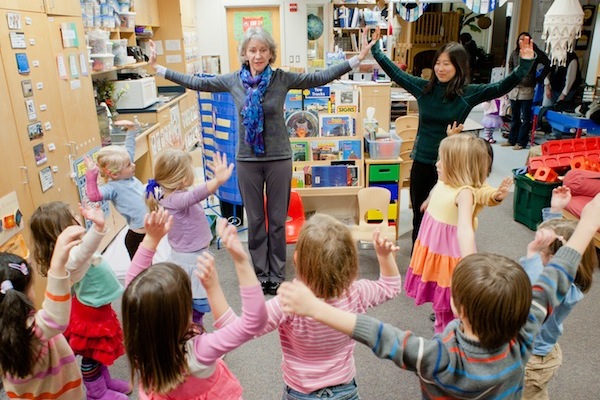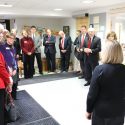Documentary film portrays UW–Madison mindfulness research

Laura Pinger, (left) teaches children mindfulness-based techniques as part of the Kindness Curriculum research study, led by Lisa Flook (right) of the Center for Investigating Healthy Minds at the Waisman Center. Photo: Krakora Studios
MADISON – Groundbreaking research at the University of Wisconsin–Madison is the focus of the new documentary film, “Free the Mind,” which debuts in Madison tomorrow, May 15.
Directed by Danish filmmaker Phie Ambo, the film chronicles the life-changing experiences of combat veterans and children who took part in mindfulness-based research studies – focused on an enhanced and calm awareness of one’s physical and mental state – at the Center for Investigating Healthy Minds (CIHM) at the UW–Madison Waisman Center, led by psychology and psychiatry professor Richard Davidson.
CIHM’s “Kindness Curriculum” study is highlighted through the story of young boy named Will and the work of CIHM staff member Laura Pinger. Pinger serves as the primary liaison between the CIHM and its educational partners, which include the Madison Metropolitan School District, Madison Head Start Program and Waisman Early Education Program, which is featured in the film. In advance of the premiere, Pinger discusses her work.
Q: What is the Kindness Curriculum?
A: It is a 24-lesson curriculum developed for 4- to 6-year-olds and rooted in mindfulness practice: paying attention on purpose and reflecting on present moment experience in an emotionally balanced manner. The curriculum, devised for research purposes, incorporates children’s literature, music, movement and play to teach and stabilize concepts and practices that we hope will enhance children’s attention and positive qualities of mind such as kindness, compassion and gratitude.
Q: How are teachers, children, and parents responding to this curriculum?
A: When asked, “What did you learn and like best about Kindness Time?” a 5-year-old responded with a smile, “Seeds of kindness – they are things that you give to other people when they’re helping you. Learning about what we can do to make ourselves calm was the best part.” A parent who attended our Family Night wrote, “Such good stuff to be teaching children! Now I can carry it over into our home environment.”
Teachers have shared positive comments, including excitement about the materials offered, the modeled lessons, and in particular, strategies to assist students’ abilities to calm themselves and to grow friendships. With teachers and students participating in these practices together, it creates a calm, peaceful environment in the classroom, based in mindfulness.
Q: What are the initial findings of the Kindness Curriculum study?
A: We have completed the pre/post testing on approximately 80 students involved in the first year of the two-year study. The most consistent finding is that teachers report a significant positive change in students’ pro-social skills. Our sample size will double in the coming year and we are hopeful that the increased number will provide the power to highlight other changes in the areas of focused attention and self-regulation.
Q: What do you hope people will take away from this film?
A: Being human can be challenging whether one is 4, 24, 44, or 84. My hope is that people watching the film realize that it is possible, at any age, to learn strategies that skillfully meet pleasant and particularly unpleasant experiences. Our research is demonstrating that this can start at a young age. Practicing ways to recognize what is actually happening within oneself and others with an attitude of kindness can become a way of being, resulting in more skillful action, rather than habitual painful reactions.
Q: What are your recommendations for those who want to learn more about mindfulness in education?
A: Begin with the Center for Investigating Healthy Minds’ website, which offers a list of useful web links, resources, and book titles as well as helpful tools for parents.
I also recommend taking a class about mindfulness to experience the learning process firsthand. The Madison community offers a wealth of resources for adults to access mindfulness meditation in either secular or religiously affiliated settings.
###
“Free the Mind” premieres in Madison on May 15, with daily showings through May 23 at Sundance Cinemas. The 7 p.m. screening on May 18 will be followed by a Q&A panel discussion with Laura Pinger and researcher Lisa Flook, moderated by Katherine Bonus, manager of UW Health Integrative Medicine, and Lincoln Elementary School Principal Deb Hoffman.
–Alison DeShaw Rowe


